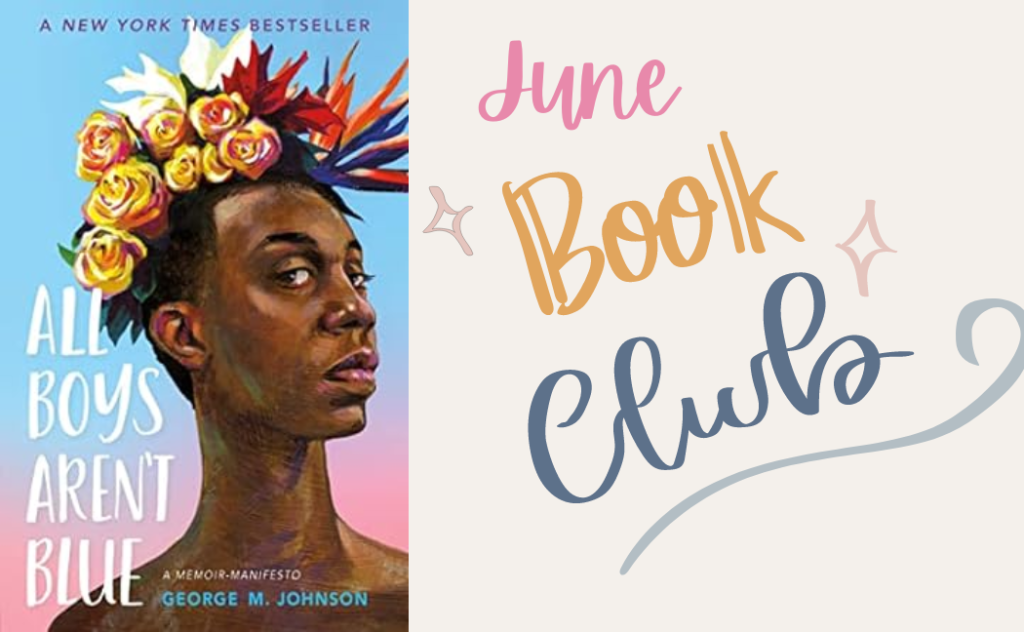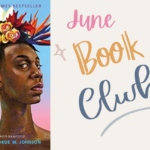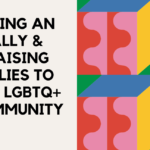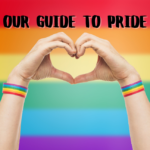Our June book club pick is “All Boys Aren’t Blue,” a LGBTQ+ memoir and manifesto by George M. Johnson. This is a powerful memoir that chronicles George’s life, from childhood through college. It is a collection of essays that tackle issues of race, gender, and sexuality. Notably, this memoir is the second most banned book of 2022 in the United States, as per the American Library Association. George is an Emmy-nominated, award-winning, and bestselling Black nonbinary author and activist. Their work on race, gender, sex, and culture has been featured in numerous prestigious publications, including Essence, The Advocate, BuzzFeed News, and Teen Vogue. George is also a proud HBCU alum and a member of Alpha Phi Alpha Fraternity Incorporated.
Why We Chose This Book
Kelly and I are avid readers of banned books, and we were particularly drawn to this one because of its compelling narrative and beautiful cover art of this LGBTQ+ memoir. We both listened to the audiobook, narrated by George themselves, which added a personal touch to their story.
Discussion Highlights
Memoir and Representation
George’s LGBTQ+ memoir addresses the lack of representation for LGBTQIAP+ individuals, particularly within the Black community. They share their personal journey of growing up in New Jersey, dealing with their identity, and the challenges faced along the way. One of the most poignant aspects of the book is George’s discussion on representation. They highlight how crucial it is to see people like oneself thriving and succeeding in order to envision similar possibilities for oneself.
The Importance of Family Support
Throughout the book, George emphasizes the significant role their family, especially their grandmother (referred to as Nanny), played in their life. Despite facing struggles with identity, George thrived due to the love and support from their family. This reinforces the importance of familial acceptance and support for LGBTQIAP+ youth.
Navigating Identity and Safety
A recurring theme in this LGBTQ+ memoir is the balance between safety and satisfaction. George shares their experiences of navigating the hyper-masculine expectations of Black culture while coming to terms with their queer identity. They describe how engaging in activities like sports provided a sense of safety, even if it meant compromising on their true passions.
Sex Education and Awareness
George’s candid discussion on sex education is particularly enlightening. They highlight the lack of resources available for the LGBTQIAP+ community and the high rates of HIV among Black men who have sex with men. George’s decision to include discussions about sex in their memoir aims to educate and provide guidance for young LGBTQIAP+ individuals.
Cultural Appropriation and Language
The book also delves into the topic of cultural appropriation. George explains how terms like “honey child” and “yes queen,” which originated in the Black gay community, have been appropriated by mainstream culture. This appropriation often occurs without the associated risks faced by the original community members.
Personal Reflections
Reading “All Boys Aren’t Blue” felt like living in George’s shoes and experiencing their journey firsthand. As middle-aged, heterosexual women, Kelly and I found many human experiences in the book that resonated with us. We admired George’s confidence, which was rooted in the unconditional love and support from their family.
Conclusion
We highly recommend “All Boys Aren’t Blue” for its raw, unapologetic narrative and the valuable perspectives it offers on identity, family, and representation. It’s a powerful read that provides deep insights into the LGBTQIAP+ experience within the Black community.





